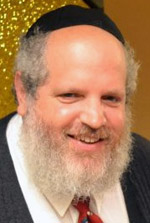Parshat Behaloticha – When You will Ascend (to light the Menorah)

CARLSBAD, California — This week’s Torah portion begins by telling us about the commandment given to Aharon HaKohen, Aaron the High Priest, regarding the Mitzvah of lighting the Menorah in the Tabernacle and later the Holy Temple. Rashi, the great classical commentator, explains that this portion is in response to Aharon’s reaction to last week’s portion, Naso, which included the inauguration of the Mishkan/Tabernacle. Each tribe’s prince brought a sacrifice except for the Tribe of Levi, which was led by Aharon. He thought that perhaps due to a flaw in him the Tribe of Levi was excluded. To that concern G-d responds with this portion and the commandment to light the Menorah.
Yes, the others brought the inaugural sacrifice, but that was a one-time occurrence. Lighting of the Menorah by the Kohanim/Priests would be a perpetual occurrence. But wait! The lighting of the Menorah stopped when the Temple was destroyed, how then can one claim that it is a perpetual occurrence? The Talmud explains that it is actually an allusion to lighting the Chanukah Menorah (also known as a Chanukiah), which came about due to the Hasmoneans, who, as Kohanim, were Aharon’s descendants. The lighting of the Chanukah Menorah will never cease.
The Menorah has become one of the foremost symbols of the Jewish people and for good reason. Let us explore some of these reasons together.
First, the Medrash wonders, why would the Almighty command us to bring light by lighting the Menorah at all? What is our light compared to His? The Medrash answers with a parable about a king who had a dear friend who was of common stock. He asked his friend to prepare a dinner that they would be able to enjoy together in his friend’s home. When the king’s entourage, who normally ushered the king wherever he went, began to arrive the friend quickly felt profound shame, for how could his simple meal served on his dinnerware in his simple home possibly be adequate for the king? He quickly put everything away. This puzzled the king who asked his friend why hadn’t he prepared anything when he knew that he was coming. The friend explained his shame. To this the king responded, “I will remove all of the vessels (the pomp and circumstance) that have accompanied me, and because of my love for you we will use only what you have prepared!”
So too it is with Almighty G-d and those who follow His divine commandments. Indeed, G-d does not need our light, which is less than puny in comparison to His (in fact, it cannot be compared at all). G-d chooses to bask in our light because we kindled it – we created it. G-d loves the good works of our hands and basks, so to speak, in its radiance! The Menorah represents how our spiritual arousal below engenders an arousal Above.
We find that the Menorah was beaten from one piece of gold and from that one piece of gold was split into seven branches. These seven branches correspond to the seven emotional attributes that comprise the spiritual makeup of each person. Light must emanate from all of our attributes; from the attribute of lovingkindness to the attribute of self-restraint and strict justice and everything in between. The seven branches emanating from one piece of gold also symbolizes the fact that we all come from One Source. Yet, at the top of the Menorah all of the wicks were placed so that their light would point towards the center. This means that we each have our own abilities and talents that must be used to light up the world, but all of them must be used in a way that they point towards the center, towards the centrality of G-d within the world and the necessity to serve Him.
The grammar of the passage indicates that the Kohen lighting the Menorah must hold the flame near to the wick until the wick is alight and remains lit on its own. The metaphor of light within the Jewish faith is powerful. This light represents the light of G-dliness and the light of the divine soul within each of us. Our job is to be lamplighters, to kindle (read inspire) our fellow and to bring him or her close to our Father in Heaven. We must keep the kindling lamp near the wick of our friend until such time as his own light is well lit and sustaining itself.
The Kohen would light the Menorah on a daily basis. He was uniquely suited to do so due to his predisposition to loving his fellow Jew completely and sincerely. Since he was apt to see the light in his fellow he was best qualified to reveal that light. And of course this service is a representation of what all of us must do. The Rebbe, Rabbi Menachem Mendel Schneerson of righteous memory, taught that just as the case of lighting the Menorah that the Kohen found it set up, ready to light – being freshly cleaned with new wicks and oil already added – so too when we go to light up the soul of our fellow. We have to know that our friend’s soul is ready to be lit! All we have to do is bring the flame close.
Wishing everyone an uplifting, joyous, and HEALTHY Shabbos!
*
Rabbi Yeruchem Eilfort is Director of Coastal Chabads and Chabad at La Costa. Rabbi Eilfort welcomes readers’ comments and questions and may be reached at RabbiE@ChabadatLaCosta.com.